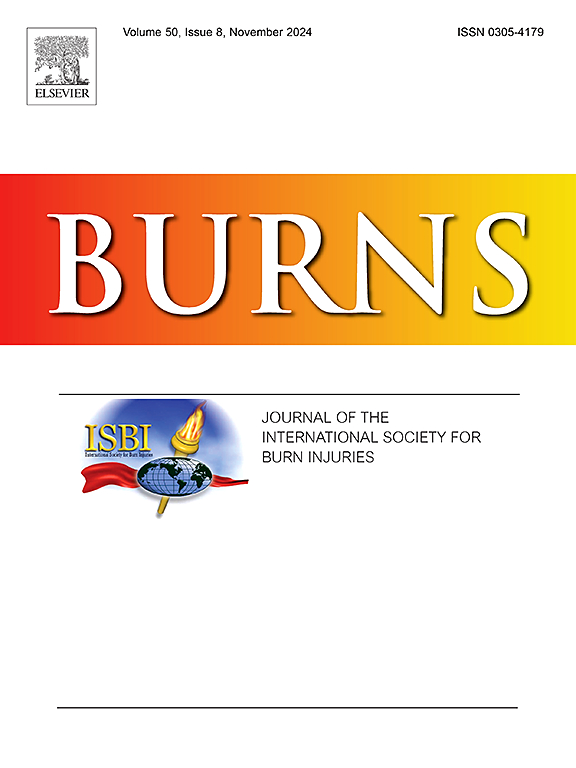Bochum烧伤生存(BoBS)评分-基于德国烧伤登记处数据开发的基于机器学习的新型烧伤生存预测评分
IF 2.9
3区 医学
Q2 CRITICAL CARE MEDICINE
引用次数: 0
摘要
背景:烧伤死亡率预测仍然是烧伤医学的一个重要方面。已建立的评分,如ABSI或Baux评分,由于危重监护和外科手术的进步,经历了不断的修订和改进。然而,这些分数通常依赖于预定义的变量和有限的统计模型。本研究旨在创建一个完全基于机器学习技术的新预测分数,并根据已建立的传统评分系统评估其性能。方法使用不同的先进机器学习方法,分析来自德国烧伤登记处的数据,包括10,000多例病例,分析与死亡率最相关的因素,并创建新的预测评分。利用随机森林和梯度增强等算法建立了新的预测模型。采用交叉验证进行内部验证,以确保稳健性和可重复性。结果Bochum烧伤生存(BoBS)评分具有较强的预测性能,准确率为93.1 %,ROC AUC为92.4 %,因此在预测性能上优于传统评分。TBSA和年龄等因素与死亡率的相关性最强,而合并症和治疗特异性变量有助于模型的改进。然而,在未来,进一步的调整和德国烧伤登记处以外的外部验证是至关重要的。BoBS评分代表了烧伤死亡率预测的范式转变,利用机器学习的潜力来分析复杂的高维数据集。与传统模型相比,BoBS评分提供了更高的准确性,同时提供了对可能影响患者预后的未开发变量的见解。但是,将这些模型整合到临床工作流程中并在不同人群中验证它们仍然存在挑战。该评分代表了烧伤死亡率预测的重大进步,它提供了一个可解释的、基于机器学习的评分系统,该评分系统使用了来自德国烧伤登记处的多中心数据。它的应用有可能增强烧伤护理的决策,标志着对严重烧伤患者的个性化医疗迈出了重要的一步。本文章由计算机程序翻译,如有差异,请以英文原文为准。
Bochum Burn Survival (BoBS) score - A novel machine learning-based burn survival prediction score developed with data from the German Burn Registry
Background
Burn mortality prediction remains a critical aspect in burn medicine. Established scores, such as the ABSI or Baux score, experience continuous revision and improvement due to advances in critical care and surgical procedures. However, these scores often rely on predefined variables and limited statistical models. This study aimed to create a new prediction score that is based solely on machine learning techniques and to assess its performance against established traditional scoring systems.
Methods
Using different advanced machine learning methods, data from the German burn registry, encompassing over 10,000 cases, were analyzed regarding the most relevant factors concerning mortality and a new prediction score was created. A new prediction model was constructed, employing algorithms such as random forests and gradient boosting. Internal validation was conducted using cross-validation to ensure robustness and reproducibility.
Results
The Bochum Burn Survival (BoBS) score demonstrates strong predictive performance with an accuracy of 93.1 % and ROC AUC of 92.4 %, therefore surpassing traditional scores in predictive performance. Factors such as TBSA and age showed the strongest correlation with mortality, while comorbidities and treatment-specific variables contributed to model refinement. However, further adjustments and external validation beyond the German Burn Registry are crucial in the future.
Discussion
The BoBS score represents a paradigm shift in burn mortality prediction, leveraging the potential of machine learning to analyze complex, high-dimensional datasets. Compared to traditional models, the BoBS score offers improved accuracy while providing insights into underexplored variables that might impact patient outcomes. But challenges remain in integrating such models into clinical workflows and validating them across diverse populations.
Conclusion
This score represents a significant advancement in burn mortality prediction by providing an interpretable, machine learning-based scoring system developed using multicenter data from the German Burn Registry. Its application has the potential to enhance decision-making in burn care, marking a significant step forward in personalized medicine for critically injured burn patients.
求助全文
通过发布文献求助,成功后即可免费获取论文全文。
去求助
来源期刊

Burns
医学-皮肤病学
CiteScore
4.50
自引率
18.50%
发文量
304
审稿时长
72 days
期刊介绍:
Burns aims to foster the exchange of information among all engaged in preventing and treating the effects of burns. The journal focuses on clinical, scientific and social aspects of these injuries and covers the prevention of the injury, the epidemiology of such injuries and all aspects of treatment including development of new techniques and technologies and verification of existing ones. Regular features include clinical and scientific papers, state of the art reviews and descriptions of burn-care in practice.
Topics covered by Burns include: the effects of smoke on man and animals, their tissues and cells; the responses to and treatment of patients and animals with chemical injuries to the skin; the biological and clinical effects of cold injuries; surgical techniques which are, or may be relevant to the treatment of burned patients during the acute or reconstructive phase following injury; well controlled laboratory studies of the effectiveness of anti-microbial agents on infection and new materials on scarring and healing; inflammatory responses to injury, effectiveness of related agents and other compounds used to modify the physiological and cellular responses to the injury; experimental studies of burns and the outcome of burn wound healing; regenerative medicine concerning the skin.
 求助内容:
求助内容: 应助结果提醒方式:
应助结果提醒方式:


